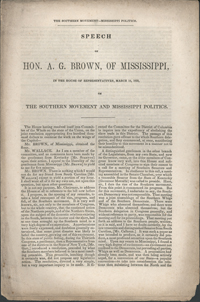1852
By the 1840s, the expansion of slavery into new territories and states became the subject of much political debate. Toward the end of that decade radical southern nationalists like Mississippi’s Albert Gallatin Brown spoke openly of secession, and the state’s Whig and Democrat parties split into States Rights and Unionist factions.
The Compromise of 1850 appeared to resolve the issue, and most Mississippi voters demonstrated approval by supporting Union candidates in the following year. In March 1852, Brown addressed his colleagues in the U.S. House of Representatives, describing the sectional movement of the past few years and making the case that Mississippi’s States Rights Democrats deserved their delegate seats at the national convention:
…we shall not ask at the hands of the Baltimore Convention an indorsement of our peculiar views on the subject of States Rights – if indeed these views be peculiar….We ask that you shall not insult us in your convention, either by offering us as the nominee a man who has denounced us as traitors to our country, or by passing any resolutions which shall thus denounce us in words or by implication. Leave us free from taunt and insult; give us a fair Democratic nomination, and we will march up to it like men, and we will be, where we have always been in our Democratic struggles, not in the rear, but in the advance column.As the election neared, Harvey Walter wrote from the state capital to his wife in Holly Springs:
The mass meeting here has just ended, & the roaring of cannon, the music of bands & floating of banners are heard & seen no more -- It was but a poor affair. There is no political excitement except among partisans. The great mass of the people is quiet & indifferent.Anticipating a loss, Democrats nominated a virtually unknown candidate, Franklin Pierce of New Hampshire. Pierce, however, trounced Whig nominee Winfield Scott with one of the largest electoral victories to date. The Democrat won Mississippi by a large majority in part with Brown’s zealous support. The Whig Party soon collapsed from the internal division between its anti-slavery Northern contingent and its pro-slavery Southern wing.
A.G. Brown speech on the "Southern Movement and Mississippi Politics"
Click thumbnail to view larger image
Click here for UM Library catalog record
Letter from Harvey Walter to Mrs. H.W. Walter regarding the election canvass in Jackson, Mississippi
Click thumbnail to view larger image
Return to the top













